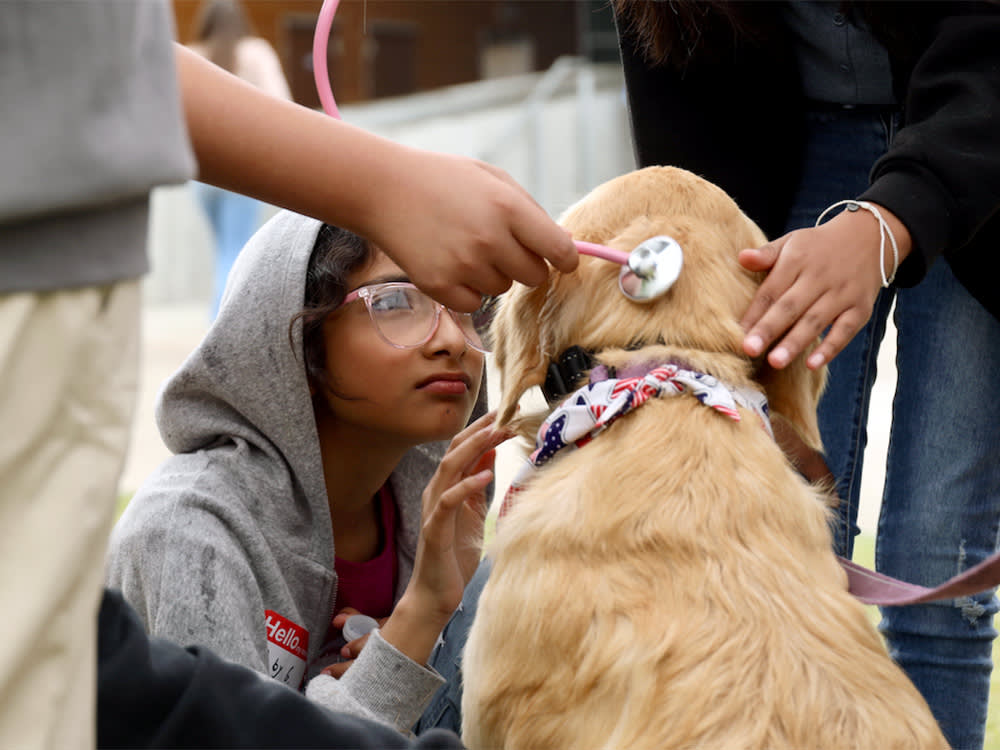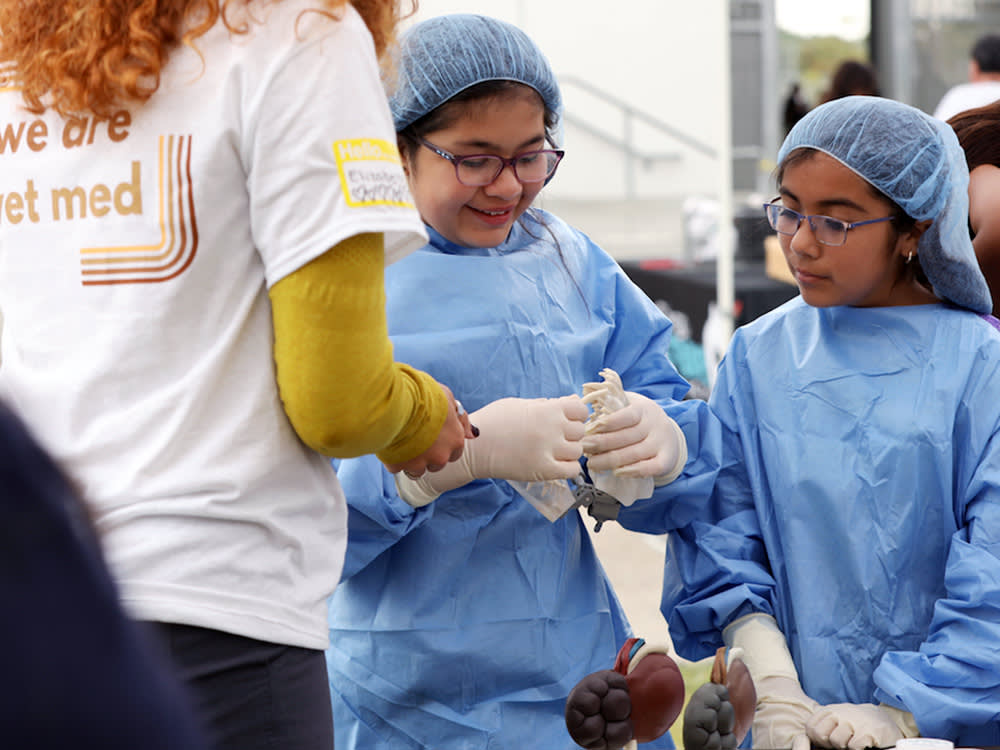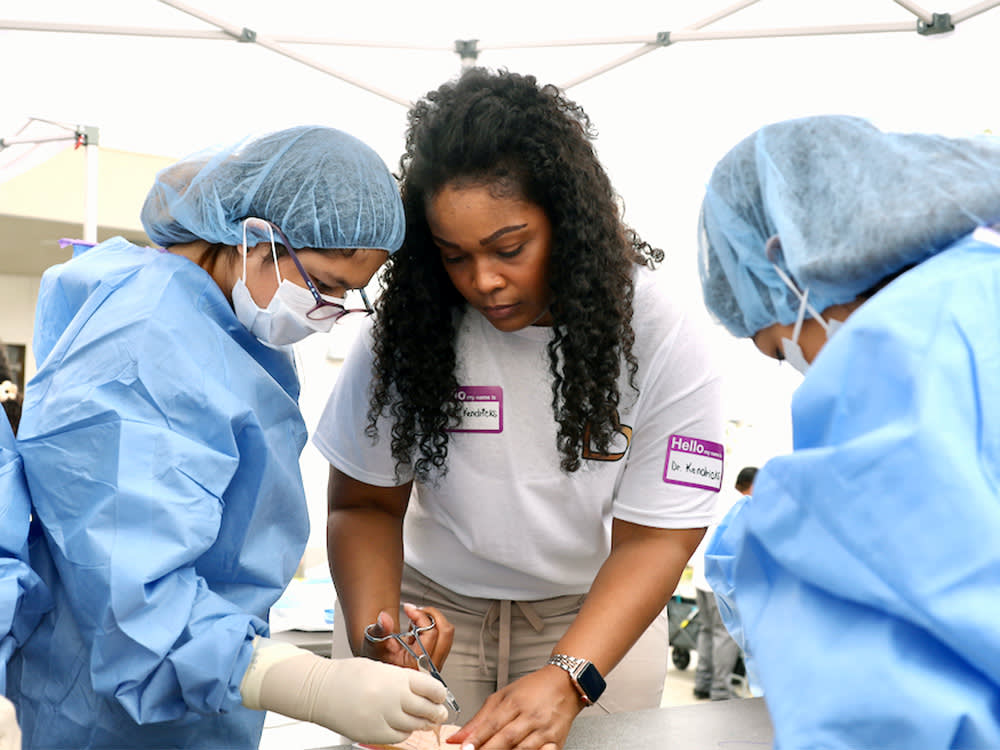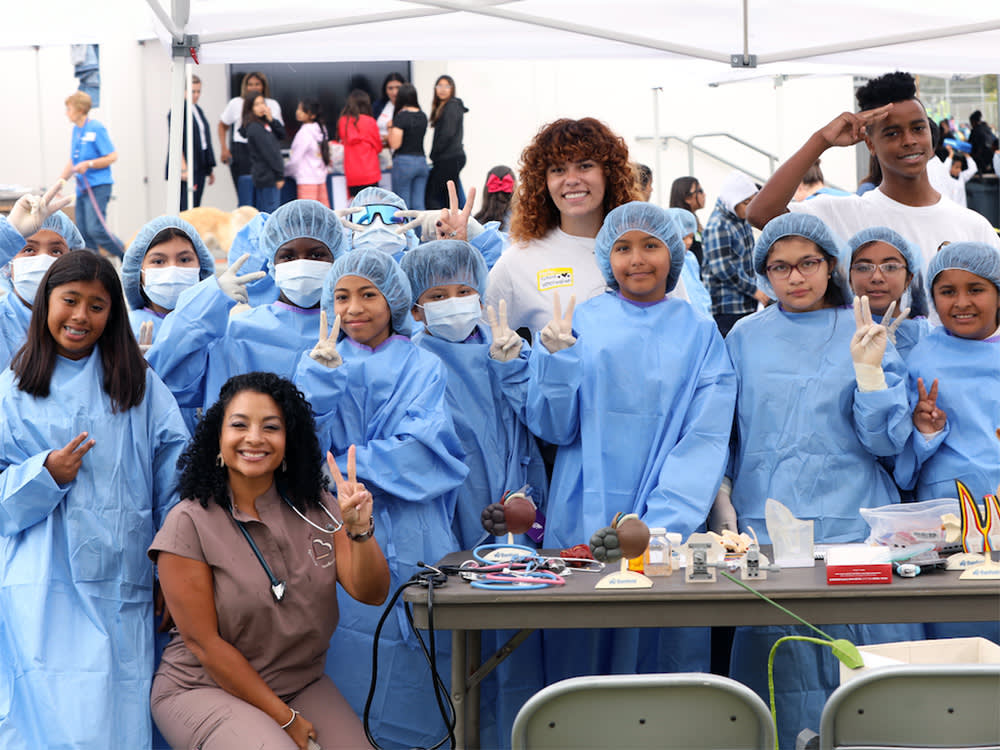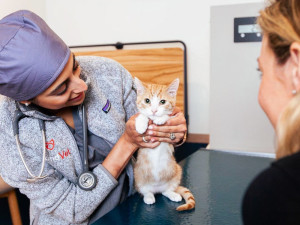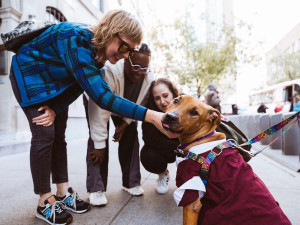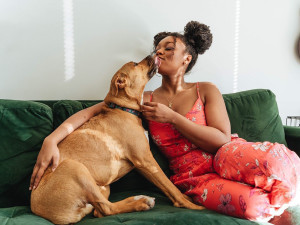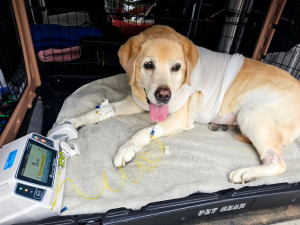91 Percent of Veterinarians Are White—This Organization Is Aiming to Change That
It’s all about encouraging the next generation of vets.
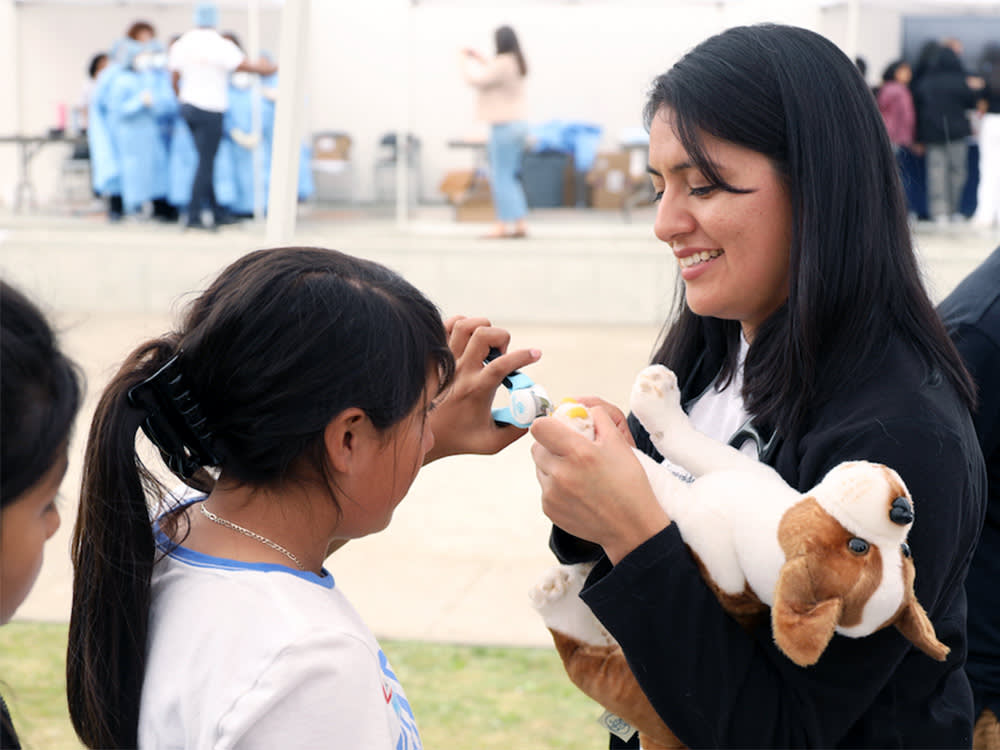
share article

Your pet wants you to read our newsletter. (Then give them a treat.)
If you ask a child what they want to be when they grow up (as we love to do in this society), a veterinarian is definitely a popular answer. Kiddos love their animals. But most children today will not see themselves reflected in the person who is actually taking care of their dog or cat. One group of veterinarians has set out to change that, creating a national training curriculum that emphasizes just how important diversity is — for vets, young people, and pet parents alike.
In a 2020 article in TIMEopens in a new tab, one mother told the publication that when her pup needed care, she wanted to find a Black veterinarian to serve as a role model to her young children. The search took her ages, and when she finally found a vet, the clinic was too far away. Eventually, she gave up.
According to the U.S. Bureau of Labor Statistics, 91 percent of veterinarians are white, though white people make up only 77 percent of the labor forceopens in a new tab; less than one percent of veterinarians are Latinx, and about two percent of veterinarians are Blackopens in a new tab.
Recently, conversations about diversity, equity, inclusion, and belonging (DEIB) have become more of a priority in many workplaces. Not only does it make the environment more comfortable, accessible, and supportive for employees, a McKinsey studyopens in a new tab shows it also improves performance outcomes. In 2023, Gallup reportedopens in a new tab that 84 percent of companies are increasing their investment in DEIB.
So yes, there has been some progress in making workspaces more inclusive, but many industries still have a long way to go — especially veterinary medicine.
Thus, BlendVET, a national DEIB training curriculum led by veterinary professionals, was born — and in the few years since its inception, it has already made an enormous impact. They offer individual or workplace certification programs in DEIB, which are designed to increase cultural awareness, create connections, improve workplace culture and retention, and give people the tools to be a resource for others. BlendVET has also offered training sessions at veterinary schools and national conferences.
“Through our programs and consulting over the last three years, blendVET has laid the groundwork for cultural change with start-up veterinary companies and privately owned veterinary hospitals,” Dr. Niccole Bruno, the founder and chief executive officer, tells The Wildest.
Working with the youth
Possibly the most important part of blendVET’s mission involves working directly with young people. Through their pathway programs in partnership with the American Animal Hospital Association and North American Veterinary Community, they introduce young people to veterinary medicine and educate parents on how they can best support their kids’ aspirations.
These pathway programs also show young people what so many lack growing up: representation of someone who looks like them thriving in the veterinary profession. “[I am] privileged to have a successful career in veterinary medicine, but I am often the only woman of color in any of my leadership roles,” says BlendVET’s chief operating officer, Dr. Genine Ervin-Smith. “Therefore, throughout the years it has become my passion to change this narrative for those following in my footsteps.”
Students rotate through different specialty stations throughout the day, learning about everything from shelter medicine to zoo medicine to dermatology. “Our pathway programming by far is something that I am most proud of because it allows us to pour into children,” Ervin-Smith says. “It also re-energizes my colleagues and I, as we remember our why and purpose within veterinary medicine.”
How blendVET came to life
Dr. Bruno has felt a calling to helping animals since she was a child. “I’ve always been drawn to animals and empathized with their suffering,” she tells The Wildest.
Growing up in New York, pets weren’t allowed in her apartment complex — but she would frequently feed stray animals with food she purchased with her allowance. “When my parents allowed me to ‘sneak’ a Siamese cat into our apartment at the age of 12, my experience as a pet owner solidified my love for pets and medicine, and from then on I was determined to become a veterinarian,” Dr. Bruno says.
She attended undergraduate at Tuskegee University and received her Veterinary Doctorate degree from Cornell University College of Veterinary Medicine, going on to serve as the medical director for a veterinary hospital. All the while, Dr. Bruno confronted the daily challenges of racism and misogyny, which according to the blendVET website, “caused Dr. Bruno to develop a sense of disengagement from a profession she once dearly loved.”
Then, in 2020, Dr. Bruno led a DEIB presentation for a group of veterinary professionals and students. “Many students reached out to thank me for sharing my story of why DEI matters in veterinary medicine,” Dr. Bruno says. “It was then I realized more academic work regarding DEIB was necessary. My lived experiences had resonated so profoundly with the students, their overwhelming response confirmed the need to prepare future minority veterinarians for the profession that lay ahead.”
Dr. Ervin-Smith is also a lifelong animal lover and highly accomplished veterinary professional. She was highly impressed by the idea of blendVET.
“Dr. Bruno’s first presentation discussing diversity in veterinary medicine planted the seed for blendVET’s creation: a program that celebrates cultural diversity and drives workplace environments towards genuine inclusion and allyship,” Dr. Ervin-Smith tells The Wildest. “Dr. Bruno’s goal was to place the focus of veterinary medicine on the people of our profession and reignite the veterinary professionals’ passion for serving our communities and the pets we love dearly.”
Moving forward
This work is far from over, and Dr. Bruno and Dr. Ervin-Smith are continuing to spread blendVET’s mission to create a more inclusive culture in veterinary medicine. This better future will benefit pet parents as well as vets — when an animal is taken to a blendVET certified hospital, pet parents will know they, and their pet will receive care from compassionate, trained professionals with diverse backgrounds. And through their education outreach, they are ensuring the next generation of vets are more representative of the wider country’s population — and they are giving those future vets the confidence that comes with seeing people like them succeed.
If you’re a veterinary professional, you can start expanding your DEIB knowledge and applying blendVET’s values to your workplace by registering at the link below. You can also volunteer with blendVET’s pathway programming to bring the possibility of a career in veterinary medicine to students in your area.
References:
Labor Force Characteristics By Race and Ethnicity, 2022opens in a new tab
Research: Where Employees Think Companies’ DEIB Efforts Are Failingopens in a new tab

Sio Hornbuckle
Sio Hornbuckle is a writer living in New York City with their cat, Toni Collette.
Related articles
![A smiling veterinarian holding a cat]() opens in a new tab
opens in a new tabVets Are at High Risk For Compassion Fatigue—Here Are 4 Ways You Can Help
It’s extra important to be nice to the vet in your life.
![Black woman smiling and holding a Siamese cat which is looking into the camera]() opens in a new tab
opens in a new tabCARE Is Amplifying BIPOC Voices to Keep People and Pets Together
“We don’t consider what we are doing animal welfare work. We are taking a holistic approach to well-being for animals and humans.”
![Group of young people pet a brown dog with a jacket on outside.]() opens in a new tab
opens in a new tabHow DIY Animal Rescuers Tell The Exhausting, Rewarding Stories of Their Work
In volunteers’ Instagram videos, you’ll see both the joy and the fatigue behind finding these deserving pets homes.
![Kassidi Jones sitting on a green velvet couch with her curly hair in two big pom poms and wearing a coral spaghetti strap jumpsuit while her tan dog Gingers Naps licks her face.]() opens in a new tab
opens in a new tabKassidi Jones and Her Pit Bull Ginger Are Shedding Light on Pet Parenthood and Racism
The academic — an exciting, emerging voice in animal advocacy — comes wielding both cute Pit Bull pics and uncomfortable truths.
![Smiling veterinarian examining medical documents of a Bulldog standing on her examination table]() opens in a new tab
opens in a new tab10 Tips to Give Your Dog a Blissful Vet Visit
Reduce the stress of veterinary visits — for you and your pup.
![Veterinary Ambulance of So Cal, run by Albert Sanchez.]() opens in a new tab
opens in a new tabThis Former Vet Tech Is the Hero Every Pet Parent Needs in an Emergency
Albert Sanchez’s Veterinary Ambulance of Southern California brings pets to accessible emergency vet care when they need it—any time of day or night.
